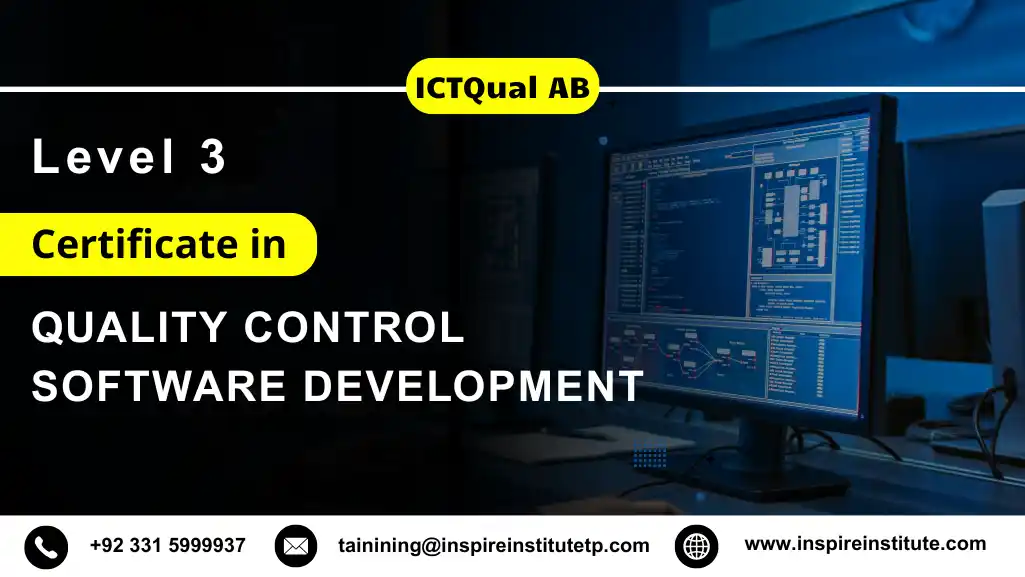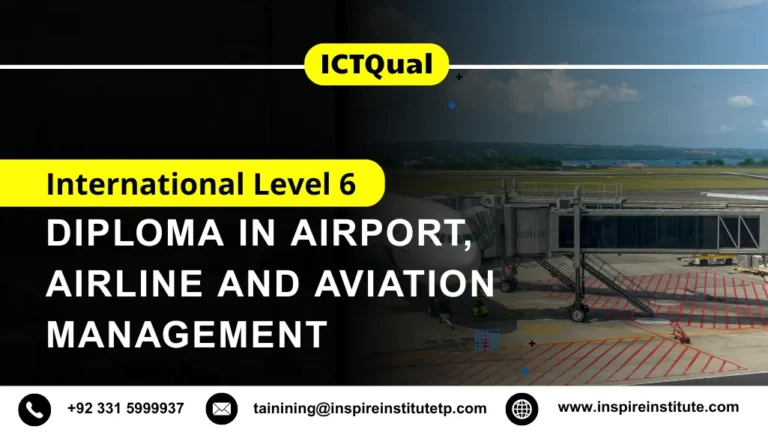ICTQual AB Level 3 Certificate in Quality Control Software Development
The ICTQual AB Level 3 Certificate in Quality Control Software Development offers an excellent opportunity for aspiring software testers and quality assurance specialists to build a strong foundation in quality control principles and practices. This qualification is designed to equip learners with essential skills to ensure that software products meet the highest standards of quality, reliability, and performance. In today’s fast-evolving digital landscape, the demand for skilled professionals in software quality control is higher than ever. The ICTQual AB Level 3 Certificate in Quality Control Software Development is an ideal qualification for anyone aiming to enter or progress within the software quality assurance field.
The ICTQual AB Level 3 Certificate in Quality Control Software Development is a vocational qualification focused on imparting practical knowledge and skills in software quality assurance. This certificate covers key aspects such as software testing techniques, defect tracking, quality standards, and tools used in the quality control process within software development projects. With its practical approach and industry-aligned curriculum, it prepares learners to meet the quality demands of modern software development projects effectively.
Why Choose this Qualification
Choosing the right qualification is crucial for building a successful career in software quality assurance. Here are the key reasons why the ICTQual AB Level 3 Certificate in Quality Control Software Development stands out:
- Industry-Relevant Curriculum: The course is designed to cover the latest software quality control techniques, tools, and best practices used in the IT industry today.
- Practical Skills Development: It focuses on hands-on learning, enabling students to apply quality control methods in real-world software testing scenarios.
- Enhances Employability: This certification equips learners with skills highly sought after by employers, increasing job opportunities in the competitive IT sector.
- Foundation for Career Growth: It provides a solid base for further studies or progression into advanced quality assurance or software development roles.
- Flexible and Accessible: Suitable for beginners and working professionals alike, the course offers flexible learning options to fit diverse schedules.
- Globally Recognized Qualification: The ICTQual AB certification is respected internationally, opening doors to career opportunities worldwide.
- Improves Understanding of Software Development Life Cycle: Helps professionals contribute effectively to software projects by ensuring high standards of quality throughout development.
Choosing this ICTQual AB Level 3 Certificate in Quality Control Software Development means investing in a career path that is both in demand and rewarding, with opportunities across multiple industries reliant on quality software solutions.
Course Overview
Awarding body : ICTQual AB
Course Level: 3
Credits : 10
Study Units: 3 Units
Evidence & Assignment Based
Qualification Structure
This qualification, the ICTQual AB Level 3 Certificate in Quality Control Software Development, consists of 3 mandatory units.
- Fundamentals of Software Quality Assurance
- Software Development Life Cycle (SDLC) and Testing Methods
- Defect Tracking and Reporting Systems
Who Should Take This Course
This ICTQual AB Level 3 Certificate in Quality Control Software Development is ideal for a wide range of individuals looking to build or advance their careers in software quality assurance and testing, including:
- Aspiring Software Testers: Those new to the IT industry who want to start a career in software testing and quality control.
- IT Graduates: Recent graduates looking to specialise in quality assurance within software development.
- Software Developers: Developers who want to deepen their understanding of quality control to improve the software they build.
- Quality Assurance Professionals: Individuals currently working in QA roles seeking formal certification to validate and enhance their skills.
- Project Managers: Professionals managing software projects who need to understand quality control processes to deliver successful projects.
- Anyone Interested in Software Quality: Enthusiasts or career changers who want to enter the field of software quality assurance and testing.
This qualification provides the essential knowledge and practical skills for anyone aiming to play a key role in delivering high-quality software products.
Course Benefits
Enrolling in this qualification offers numerous advantages for learners aiming to excel in software quality control:
- Develop Practical Testing Skills: Gain hands-on experience with manual and automated software testing techniques that are directly applicable in the workplace.
- Enhance Career Prospects: Improve your employability with a recognised certification valued by employers in the IT and software industries.
- Understand Quality Standards: Learn how to apply international quality control standards and best practices to ensure software reliability and performance.
- Boost Confidence in Software Delivery: Acquire the skills to identify defects early, reducing costly errors and improving overall software quality.
- Expand Knowledge of Software Development Lifecycle: Understand how quality control fits into each stage of software development, enabling better collaboration with development teams.
- Flexible Learning Path: Suitable for beginners and professionals, offering a stepping stone towards advanced qualifications and career progression.
- Global Recognition: The qualification is internationally recognised, opening doors to opportunities in diverse markets and industries.
These benefits make the ICTQual AB Level 3 Certificate a valuable investment for anyone serious about a successful career in software quality assurance.
Eligibility Criteria
To enrol in the ICTQual AB Level 3 Certificate in Quality Control Software Development, candidates should typically meet the following criteria:
Basic IT Knowledge: A fundamental understanding of computers and software is recommended, though formal qualifications are not always mandatory.
Educational Background: Usually, learners with a high school diploma or equivalent can apply. Some prior study in IT or related fields is advantageous but not required.
Age Requirement: Candidates are generally expected to be at least 16 years old, but this may vary by training provider.
Language Proficiency: Adequate English language skills are necessary to comprehend course materials and assessments.
No Formal Experience Required: This qualification is designed for beginners and those new to software quality control, so previous professional experience is not mandatory.
The Qualification Process
The ICTQual AB Level 3 Certificate in Quality Control Software Development follows a structured and learner-friendly qualification process that blends academic study with real-world coaching skills. The process is designed to develop competent, ethical, and client-focused health coaches who are capable of supporting others in achieving sustainable lifestyle changes. Below is an overview of the key stages in the qualification journey:
• Admission and Enrolment
Learners begin by applying through an approved ICTQual AB training provider, where they must:
• Submit proof of identity and academic qualifications (typically Level 3 or equivalent)
• Demonstrate proficiency in English (e.g., IELTS 5.5 or equivalent)
• Complete a personal statement or interview (where required) to assess interest in health and wellness coaching
Once approved, learners are formally enrolled and given access to course resources.
• Course Orientation
New learners receive a full orientation that includes:
• An introduction to the course structure, units, and learning outcomes
• Guidelines on assignments, deadlines, and tutor support
• Information about coaching practice expectations and ethical conduct
• Programme Delivery
The course is delivered through a flexible format, which may include:
• Online, blended, or classroom-based learning
• Interactive webinars and tutorials
• Independent reading and research
• Practical exercises and case studies
This delivery style supports learners in balancing their studies with work or personal commitments.
• Core Areas of Study
Learners explore a broad and practice-driven curriculum, including:
• Foundations of health coaching and behaviour change
• Goal setting and action planning
• Motivational interviewing and communication strategies
• Health promotion and wellness concepts
• Coaching ethics and professional boundaries
• Reflective practice and personal development
• Coaching Practice
Though not always mandatory, learners are encouraged to:
• Apply coaching tools in real or simulated sessions
• Record and reflect on client progress
• Gather feedback to improve coaching performance
Some training centres may also include practical assessments, role-plays, or coaching portfolios.
• Assignments and Assessments
Assessment is based entirely on coursework. Learners are required to:
• Complete written assignments, reflective journals, and coaching session plans
• Submit case studies and progress reports
• Demonstrate understanding of theory through practical application
• Present evidence of learning in a structured portfolio
• Tutor Support and Feedback
Throughout the course, learners benefit from:
• One-on-one academic guidance
• Regular tutor feedback on assignments
• Coaching supervision or mentorship (depending on provider)
• Access to learning platforms and study materials
• Internal and External Quality Assurance
All assessments are:
• Internally verified by the training provider
• Externally quality-assured by ICTQual AB to ensure fair grading and regulatory compliance
This two-tier system maintains the academic integrity and credibility of the qualification.
• Certification
Upon successful completion of all course units and submission of required evidence, learners are awarded the ICTQual AB Level 3 Certificate in Quality Control Software Development.
• Post-Qualification Progression
Graduates of this diploma can:
• Begin or advance a career as a Quality Control Software Development
• Work in private practice, community health programmes, or corporate wellness
• Progress to higher-level coaching or health-related qualifications
• Seek accreditation with national or international coaching bodies (subject to additional requirements)
This structured process ensures learners graduate with the practical confidence, professional standards, and academic grounding needed to thrive as ethical and effective health practitioners in a growing global wellness industry.







